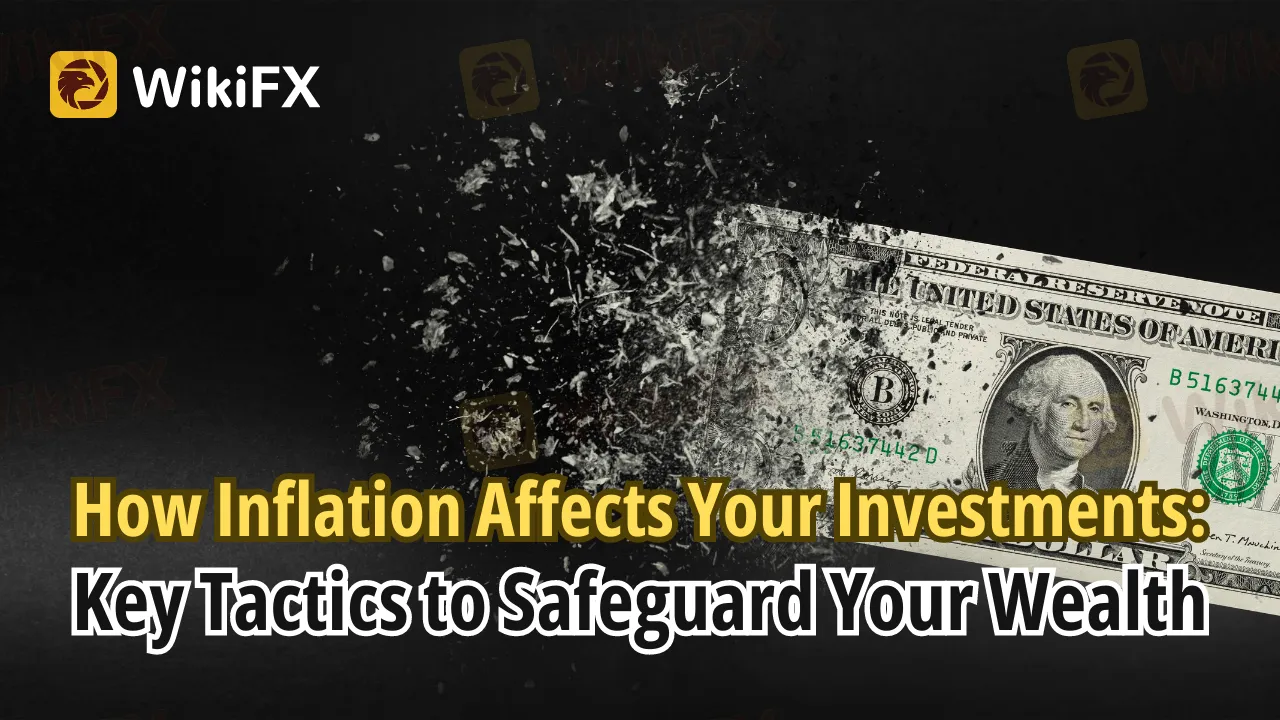简体中文
繁體中文
English
Pусский
日本語
ภาษาไทย
Tiếng Việt
Bahasa Indonesia
Español
हिन्दी
Filippiiniläinen
Français
Deutsch
Português
Türkçe
한국어
العربية
How Inflation Affects Your Investments: Key Tactics to Safeguard Your Wealth
Abstract:Explore the effects of inflation on investments and learn key strategies to safeguard your wealth. Understand how to combat inflation's erosive impact on your financial future.

Inflation is often dubbed as the silent destroyer of wealth. Without due attention, it can erode the value of your investments, making it essential for all investors to gauge its effects and adjust their strategies accordingly. Let's delve into how inflation can affect your investments and explore ways to shield your wealth from its grasp.
Understanding Inflations Grip
At its core, inflation represents the gradual increase in the prices of goods and services. This escalation results in the reduced purchasing power of money over time. In simpler terms, the same amount of money can buy fewer items than it could in the past.
Notably, since the Covid-19 pandemic, global inflation rates, including South Africa's, have seen a surge. Factors contributing to this hike include supply chain disruptions, expansive government financial interventions, plummeting interest rates, escalating oil prices, and workforce shortages.
South Africa witnessed its inflation rate peak at 7.8% in July 2022, a figure significantly above the 4.5% target set by the South African Reserve Bank (Sarb). Such surges in inflation led to subsequent hikes in interest rates. However, the silver lining is the recent downtrend since that peak, with June 2023 marking an inflation rate of 5.4%.
Impacts of Inflation on Various Investments:
Loss of Purchasing Power: Your investments may appear to grow in value, but once inflation is factored in, the real worth may stagnate or even diminish. If you gain a 5% return on an investment with a 3% inflation rate, your real profit is only 2%.
Fixed-income Investments: Bonds, for instance, become more vulnerable during inflation. The purchasing power of interest payments from these securities can decline, and when the bond reaches maturity, its principal might be worth less than at the outset.
Equities: Although stocks can act as an inflation buffer, they're not immune. High inflation can raise a company's operational costs, affecting its bottom line. If these businesses cannot transfer this price rise to consumers, their profitability may suffer, impacting stock values.
Real Estate: Properties often fare well during inflationary phases, as their values tend to appreciate. They also offer rental income potential, which might grow in tandem with inflation.
Wealth Preservation Tactics in an Inflationary Setting:
Diversification: Spreading your investments across varied asset classes can cushion the blow of inflation, balancing out any losses with gains elsewhere.
Inflation-adapted Securities: Options like Treasury Inflation-Protected Securities (TIPS) adjust their worth based on inflation metrics, ensuring you remain a step ahead.
Stocks: Despite occasional hiccups, equities usually have a track record of outpacing inflation in the long run. Companies adept at maneuvering through inflationary times tend to sustain or even boost their market value.
Tangible Assets: Physical properties, precious metals, commodities, and infrastructure projects can be beneficial due to their intrinsic worth and potential appreciation.
Final Thoughts
Inflation can be a formidable adversary for investors. However, by grasping its implications and employing well-thought-out strategies, it's possible to turn the tide in your favor. Staying updated and harnessing expert advice are instrumental in fortifying your investments against inflationary challenges.
For continuous updates on financial developments, consider using resources like the WikiFX App. Find it at: https://www.wikifx.com/en/download.html.

Disclaimer:
The views in this article only represent the author's personal views, and do not constitute investment advice on this platform. This platform does not guarantee the accuracy, completeness and timeliness of the information in the article, and will not be liable for any loss caused by the use of or reliance on the information in the article.
Read more

IG 2025 Most Comprehensive Review
This article evaluates the broker from multiple dimensions, including a basic introduction, fees, safety, account opening, and trading platforms.

EXNESS 2025 Most Comprehensive Review
This article evaluates the broker from multiple dimensions, including a basic introduction, fees, safety, account opening, and trading platforms.

Top Profitable Forex Trading Strategies for New Traders
Know profitable Forex strategies for beginners, including risk management tips, best currency pairs, technical analysis tools, and timeframe selection.

WikiFX Review: Is IVY Markets Reliable?
IVY Markets, established in 2018, positions itself as a global brokerage offering a diverse range of trading instruments, including Forex, Commodities, Cryptocurrencies, and Stocks. The platform provides two primary account types—Standard and PRO—with a minimum deposit requirement of $50 and leverage up to 1:400.
WikiFX Broker
Latest News
Germany's Election: Immigration, Economy & Political Tensions Take Centre Stage
WikiFX Review: Is IVY Markets Reliable?
Why Do You Keep Blowing Accounts or Making Losses?
eToro Adds ADX Stocks to Platform for Global Investors
B2BROKER Launches PrimeXM XCore Support for Brokers
IG 2025 Most Comprehensive Review
Checkout FCA Warning List of 21 FEB 2025
Google Bitcoin Integration: A Game-Changer or Risky Move?
Why Should Women Join FX Market?
ED Exposed US Warned Crypto Scam ”Bit Connect”
Currency Calculator






